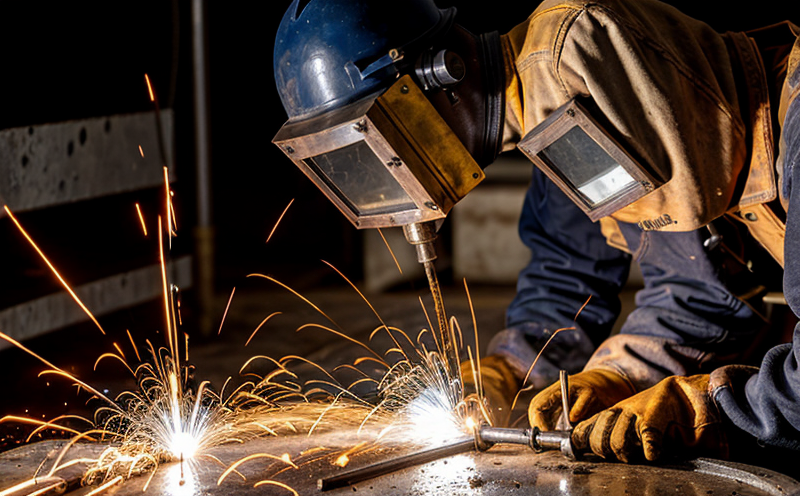ISO 6847 Chemical Analysis of Welding Consumables
The ISO 6847 standard provides a comprehensive framework to ensure the chemical composition and quality of welding consumables, which are essential for achieving reliable and safe welds. This service ensures that manufacturers and users can verify the chemical properties of materials used in welding processes, thereby enhancing product reliability and compliance with international standards.
The importance of accurate chemical analysis cannot be overstated, especially when dealing with critical industrial applications where safety and performance are paramount. For instance, in aerospace or nuclear industries, even minor deviations from specified composition levels can lead to catastrophic failures. This service ensures that the materials used meet stringent quality control requirements as defined by ISO 6847.
The process involves analyzing various elements such as carbon (C), silicon (Si), manganese (Mn), sulfur (S), phosphorus (P), chromium (Cr), molybdenum (Mo), and others, depending on the type of welding consumable. The analytical methods employed are precise and reliable, ensuring that the results meet or exceed the specified limits set by ISO 6847.
Quality managers rely heavily on this service to ensure product consistency and reliability. Compliance officers use it to verify adherence to regulatory standards, while R&D engineers leverage these analyses to optimize material formulations and improve performance characteristics. Procurement teams benefit from this service as well, ensuring that the welding consumables they source comply with international quality requirements.
For a deeper understanding of how ISO 6847 is applied in practice, let's delve into its scope and methodology. The standard covers the chemical analysis of various types of welding consumables including electrodes, fluxes, and wire products used in arc welding processes.
Scope and Methodology
| Category | Description |
|---|---|
| Sample Preparation | The samples are prepared by cutting the consumables into small, uniform pieces. These pieces are then cleaned to remove any contaminants that might affect the analysis. |
| Element Analysis | Elements such as carbon, silicon, manganese, sulfur, phosphorus, chromium, molybdenum, and others are analyzed using techniques like X-ray fluorescence (XRF) or inductively coupled plasma optical emission spectrometry (ICP-OES). |
| Acceptance Criteria | The results of the analysis must fall within the specified limits set by ISO 6847. Any deviation from these limits would indicate a potential quality issue. |
| Quality Control | A robust quality control process ensures that all samples are analyzed under consistent conditions, thus maintaining the reliability and accuracy of the results. |
The standard is designed to ensure that the chemical composition of welding consumables meets the required specifications. This is achieved through a combination of sample preparation, element analysis using advanced analytical techniques, and strict adherence to acceptance criteria. The quality control process ensures consistency in testing results, thereby enhancing product reliability.
By following these rigorous procedures, ISO 6847 ensures that welding consumables are produced to the highest standards. This not only enhances safety but also improves the overall performance of welded structures. For industries reliant on critical welding processes, this service is indispensable for maintaining high-quality standards and ensuring compliance with international regulations.
Eurolab Advantages
At Eurolab, we pride ourselves on delivering unparalleled quality in chemical analysis services. Our expertise in metallurgy and material testing ensures that you receive accurate and reliable results every time. Here are some of the key advantages:
- Advanced Equipment: We utilize state-of-the-art analytical equipment to perform precise and accurate analyses.
- Skilled Personnel: Our team comprises highly trained and experienced professionals who understand the nuances of material testing.
- Comprehensive Reporting: We provide detailed reports that offer insights into the chemical composition of your welding consumables.
- Fast Turnaround Times: We understand the importance of timely results, which is why we strive to deliver them quickly without compromising on quality.
- Custom Solutions: We can tailor our services to meet your specific needs, whether it's for a one-off analysis or ongoing testing.
- Compliance Assurance: Our rigorous processes ensure that all tests comply with the latest international standards including ISO 6847.
- Confidentiality: We respect your data and maintain strict confidentiality, ensuring that sensitive information remains secure.
With Eurolab, you can be confident in the quality of our services. Our commitment to excellence ensures that every test is conducted with precision and care, providing you with the confidence needed for critical decisions related to welding consumable quality.
Environmental and Sustainability Contributions
The ISO 6847 chemical analysis service has significant environmental and sustainability contributions. By ensuring consistent and reliable quality in welding consumables, we contribute to safer and more efficient production processes across various industries. This leads to reduced waste and energy consumption, as well as improved product performance.
For instance, in the construction industry, where large-scale steel structures are fabricated using welding, accurate chemical analysis ensures that the materials used are of the highest quality. This results in stronger and more durable structures, reducing the need for costly repairs or replacements over time. In turn, this helps to minimize environmental impact by extending the lifecycle of these structures.
In manufacturing environments, where precision is key, ISO 6847 ensures that every weld meets the required standards. This not only enhances product quality but also reduces material wastage during production processes. By adhering to strict chemical composition requirements, we help minimize scrap rates and optimize resource usage.
Furthermore, by ensuring compliance with international standards, our services contribute to broader sustainability goals. For example, in industries such as automotive or aerospace, where lightweight materials are increasingly used, accurate chemical analysis ensures that these materials perform optimally under rigorous conditions. This can lead to improved fuel efficiency and reduced emissions from vehicles or aircraft.
At Eurolab, we are committed to sustainable practices across all aspects of our operations. From reducing paper waste through digital reporting to minimizing carbon footprints in transportation, we strive to make a positive impact on the environment while delivering exceptional services.





